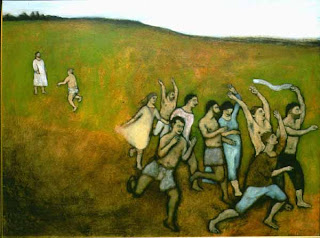
Behold, the Lamb of God, who takes away the sin of the world.
This title may be an allusion to the victorious lamb who would destroy evil in the world (Rev 5-7; 17:14); or to the paschal lamb, whose blood saved the first-born of Israel (Exodus 12); and/or the suffering servant led like a lamb to the slaughter as a sin-offering (Isaiah 53:7, 10).
A man is coming after me who ranks ahead of me because he existed before me.
We are reminded of the prologue of John’s gospel: “In the beginning was the Word, and the Word was with God, and the Word was God.”
I did not know him.
This gospel is unaware of the tradition found in Luke that Jesus and John the Bap-tist are relatives because their mothers are cousins.
But the reason why I came baptizing with water was that he might be made known to Israel.
In John’s gospel, the baptism of John was not for the forgiveness of sins but for the revelation of Jesus to Israel. “But the reason why I came baptizing with water was that he might be made known to Israel” (Jn 1:23).
I saw the Spirit come down like a dove from heaven and remain upon him.
Remain is a favourite verb of St. John. In the parable of the vine and the branches, he uses the verb remain. “I am the vine, you are the branches. Whoever remains in me and I in him will bear much fruit, because without me you can do nothing” (Jn 15:5).
Sin is disobeying the commandments.
But it is not just a matter of disobedience. In the case of Adam and Eve, it was an act of defiance (they wouldn’t recognize the authority of God) and also an act of in-gratitude (God said everything in the garden was for them, except that particular tree.).
The commandments are not meant to make life difficult for us. They are like street signs that warm us not to do this or not to do that otherwise we’ll get into an accident. For instance, God says, “Do not lie.” Imagine how the relationship between parents and children will be if they lie to one another!
Sin in the bible also understands it as missing the mark.
Once I saw boys playing softball. The pitcher threw the ball and the batter tried to hit it. He missed. “Strike 1!” the umpire said. Instead, an onlooker said: “Sala!” The batter missed. And in fact, sin is “sala”. When we sin, we miss the mark. We fail to be what we should be. The prodigal son sinned. He failed to behave as a son should behave towards his father.
When we fail to go to Mass on Sunday for reason of laziness, for example, we fail to behave the way a son or a daughter should behave toward the Father in heaven.
What can we do about sin?
First, we must remember that we can not on our own overcome sin. If we can overcome sin on our own, Jesus did not need to come down from heaven to be our Savior. How does Jesus save us from sin? Yes, he already died on the cross and so paid for sins of everybody. He applies that payment to us individually through the sacraments, especially in confession and communion. In communion, we receive the Bread that makes us strong against sin. In confession, he takes away our sins and at the same time, also makes us strong against sin.
Second, someone says: “Tukso, layuan mo ako. (Temptation, get away from me.)” Wrong. Ikaw ang lumayo sa tukso (You should be the one to run away from temptation.). If we want to avoid sin, we must avoid the occasions of sin. The occasions of sin may be people, places or things. Kung ayaw nating mapasama, umiwas sa mga BI. If you don’ want to fall into the sin of talking about the faults of others, don’t join the conversations of those who like to talk about the faults of others.
How do I know if I committed sin?
M-A-S. Masama ba (was it evil)? Alam mo bang masama (did you know it was evil? Sinadya mo ba (did you do it on purspose)? If one of them has an answer of “no”, you have not committed sin. Therefore, if you did not go to Mass on Sunday because you were sick, there is no sin. Why? Because hindi mo ginusto (you didn’t want it). Hindi mo sinadya (you didn’t mean to do it).
Baptists have been known to ask Catholics: “Are you saved?” And Catholics would not know how to answer that because it is something that we do not ask. This is the answer to that question. In fact there are three answers. First, yes, I am saved. Why? Because Jesus already died on the cross for me. He already paid for my sins. Second, I am being saved. Why? Because even today when I sin, Jesus continues to offer me his forgiveness. And finally, I hope to be saved. Because one day, I hope to be definitely be freed from sin. I hope to enter heaven where sin can not enter. All this because of Jesus Christ, my Lord and Savior.
---------------------
The Salesians of Don Bosco is a religious congregation of priests and brothers dedicated to the welfare of the young. If you feel called by God to give your life for the good of the young, you may want help in discovering if this is really God's will for you. Please get in touch with the Vocation Director (Don Bosco North Province, Philippines) - 0917-7930112 - finvoc@yahoo.com - Bro. MON CALLO SDB.












